Galway no events posted in last week
 North Korea Increases Aid to Russia, Mos... Tue Nov 19, 2024 12:29 | Marko Marjanovi? North Korea Increases Aid to Russia, Mos... Tue Nov 19, 2024 12:29 | Marko Marjanovi?
 Trump Assembles a War Cabinet Sat Nov 16, 2024 10:29 | Marko Marjanovi? Trump Assembles a War Cabinet Sat Nov 16, 2024 10:29 | Marko Marjanovi?
 Slavgrinder Ramps Up Into Overdrive Tue Nov 12, 2024 10:29 | Marko Marjanovi? Slavgrinder Ramps Up Into Overdrive Tue Nov 12, 2024 10:29 | Marko Marjanovi?
 ?Existential? Culling to Continue on Com... Mon Nov 11, 2024 10:28 | Marko Marjanovi? ?Existential? Culling to Continue on Com... Mon Nov 11, 2024 10:28 | Marko Marjanovi?
 US to Deploy Military Contractors to Ukr... Sun Nov 10, 2024 02:37 | Field Empty US to Deploy Military Contractors to Ukr... Sun Nov 10, 2024 02:37 | Field Empty Anti-Empire >>
A bird's eye view of the vineyard
 Alternative Copy of thesaker.is site is available Thu May 25, 2023 14:38 | Ice-Saker-V6bKu3nz Alternative Copy of thesaker.is site is available Thu May 25, 2023 14:38 | Ice-Saker-V6bKu3nz
Alternative site: https://thesaker.si/saker-a... Site was created using the downloads provided Regards Herb
 The Saker blog is now frozen Tue Feb 28, 2023 23:55 | The Saker The Saker blog is now frozen Tue Feb 28, 2023 23:55 | The Saker
Dear friends As I have previously announced, we are now “freezing” the blog.? We are also making archives of the blog available for free download in various formats (see below).?
 What do you make of the Russia and China Partnership? Tue Feb 28, 2023 16:26 | The Saker What do you make of the Russia and China Partnership? Tue Feb 28, 2023 16:26 | The Saker
by Mr. Allen for the Saker blog Over the last few years, we hear leaders from both Russia and China pronouncing that they have formed a relationship where there are
 Moveable Feast Cafe 2023/02/27 ? Open Thread Mon Feb 27, 2023 19:00 | cafe-uploader Moveable Feast Cafe 2023/02/27 ? Open Thread Mon Feb 27, 2023 19:00 | cafe-uploader
2023/02/27 19:00:02Welcome to the ‘Moveable Feast Cafe’. The ‘Moveable Feast’ is an open thread where readers can post wide ranging observations, articles, rants, off topic and have animate discussions of
 The stage is set for Hybrid World War III Mon Feb 27, 2023 15:50 | The Saker The stage is set for Hybrid World War III Mon Feb 27, 2023 15:50 | The Saker
Pepe Escobar for the Saker blog A powerful feeling rhythms your skin and drums up your soul as you?re immersed in a long walk under persistent snow flurries, pinpointed by The Saker >>
Interested in maladministration. Estd. 2005
 RTEs Sarah McInerney ? Fianna Fail?supporter? Anthony RTEs Sarah McInerney ? Fianna Fail?supporter? Anthony
 Joe Duffy is dishonest and untrustworthy Anthony Joe Duffy is dishonest and untrustworthy Anthony
 Robert Watt complaint: Time for decision by SIPO Anthony Robert Watt complaint: Time for decision by SIPO Anthony
 RTE in breach of its own editorial principles Anthony RTE in breach of its own editorial principles Anthony
 Waiting for SIPO Anthony Waiting for SIPO Anthony Public Inquiry >>
Voltaire, international edition
 Should we condemn or not the glorification of Nazism?, by Thierry Meyssan Wed Jan 22, 2025 14:05 | en Should we condemn or not the glorification of Nazism?, by Thierry Meyssan Wed Jan 22, 2025 14:05 | en
 Voltaire, International Newsletter N?116 Sat Jan 18, 2025 06:46 | en Voltaire, International Newsletter N?116 Sat Jan 18, 2025 06:46 | en
 After the United Kingdom, Germany and Denmark, the Trump team prepares an operat... Sat Jan 18, 2025 06:37 | en After the United Kingdom, Germany and Denmark, the Trump team prepares an operat... Sat Jan 18, 2025 06:37 | en
 Trump and Musk, Canada, Panama and Greenland, an old story, by Thierry Meyssan Tue Jan 14, 2025 07:03 | en Trump and Musk, Canada, Panama and Greenland, an old story, by Thierry Meyssan Tue Jan 14, 2025 07:03 | en
 Voltaire, International Newsletter N?114-115 Fri Jan 10, 2025 14:04 | en Voltaire, International Newsletter N?114-115 Fri Jan 10, 2025 14:04 | en Voltaire Network >>
|
Galway : Congolese Community Demonstrate.
 galway |
rights, freedoms and repression |
news report galway |
rights, freedoms and repression |
news report
 Thursday June 30, 2005 22:38 Thursday June 30, 2005 22:38 by Dunlo Tom - Shell to Sea by Dunlo Tom - Shell to Sea

Enough is Enough !
Marking The Democratic Republic of Congo's independence day, over a hundred of Galway's Congolese and African community, along with a sprinkling of Galway activists, took to the streets today to protest against the wanton slaughter of 10 million DRC civilians this past decade, the refusal of the DRC's transitional government to hold elections and at the fact that life expectancy in their country remains at early to mid-forties.
This love bomb of a protest, the singing, dancing, drumming, the pristine joie de vivre made us token "sprinklers" sheepish (all of us seasoned protest marchers), made us feel that we are only saturnine tyros when it comes to protesting - with such positive energy, perhaps, Ireland's Congolese/African community
could do us all a favour by levitating the Pentagon 99 miles high before dumping it with maximum contempt into the Mindinao Trench?.
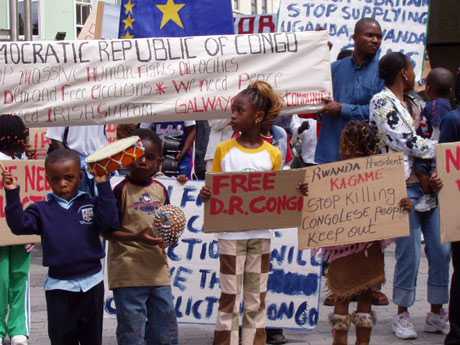 After being encouraged by their head honcho, Mr Edmond Lukusa and mindful of Shell's criminal complicity in the judicial murder of nine Ogoni activists ten years ago in Nigeria, most of the protesters joined the Shell to Sea protest outside Shell's depot in the docks. With good reason, the main man there, Padraig Cambell, heaped tons of praise and appreciation on their deserving shoulders.
Edmond Lukusa's speech to his compatriots : The People of the Democratic Republic of Congo (DRC) in Central Africa live with the scars of a devastating 5-year civil war that caused the deaths of almost 4 million people. At the end of 2004, a report by the International Rescue Committee stated that between January 2003 and April 2004 over 1,000 people died every day in the country, as a result of ongoing conflict and humanitarian crises. They called it 'the deadliest war in the world since World War 2'.
The war in DR Congo disrupted trade and farming, adding to economic woes caused by decades of dictatorship. Mobutu looted billions of dollars from the country during his 32 years in power. He left it without proper road, rail or telephone systems. Hyperinflation and shortages of basic goods followed under Laurent Kabila, whose son Joseph Kabila of his true name Achilles Christopher Kanambe succeeded him illegally.
Because of war, homes and hospitals have been destroyed, children are without families, and there is widespread sickness, lack of clean water, food, shelter, basic medical supplies, health care services and education while the theft of resources continues. There are still terrible human rights violations in the country, including intimidation, rape and torture committed with total impunity especially through illegal prisons hidden all over the country.
The economic exploitation is ongoing, and the transitional government that took office in June 2003, following agreement between warring parties, is an ineffective one. The parties engaged in the conflict in the DRC signed a Global and Inclusive Agreement on December 17, 2002. It specified that national elections should take place before July 2005, which means that the 30th June 2005, today's date should be the deadline laid out by that agreement. When Kabila's government announced the postponement of elections, the people angrily protested with demonstrations on the streets of the capital, Kinshasa.
Today's date, we are afraid people might be shot dead in the streets of the DR Congo according to the threats of oppression made recently by the government (sic). Congolese people all over the world are determined to stop this endless transition which started about 20 years ago and are now fed up with all kinds of pretexts and fallacious promises made by those who continue looting the country in complicity with neighbouring and the world's most powerful countries because of the lure and plunder of our gold and other Congolese wealth.
The election problem is crucial indeed in the DR Congo, given that the transitional government is troubled by internal dissent and uncertain motivations. For example, the International Crisis Group reported that "the president and his quartet of vice-presidents, several of whom represent former rebel factions, spend most of their time jockeying for political and military advantage before an election, which in fact they really don't want to take place'. The government has not approved most of the laws that are necessary for elections to take place, and issues relating to refugees and displaced peoples, the demobilization of local armed groups and the presence of foreign armies on Congolese soil heve yet to be resolved.
There is ongoing exploitation of natural resources (such as coltan used in mobile phones, diamonds, timber and many more) and trafficking in arms is rampant in the eastern part of the country, where foreign companies and neighbouring Rwanda, Uganda and Zimbabwe are involved.
We call on the Irish and other governments to do all in their power, especially through the UN and EU, to put pressure on the DRC's transition government to resign immediately and give way to the National Conference for the organization of free and transparent elections. We also seek an end to the exploitation of the DRC's economic resources by foreign agencies and call for immediate and appropriate tough action against those who are directly or indirectly responsible.
Only democratically elected government with the support of the Congolese people and the international community can stop the suffering that the people of the DRC have endured for so long.
We have really appreciated your participation in our demonstration and we thank you for your support.
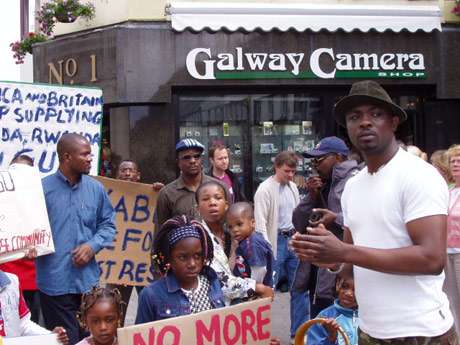
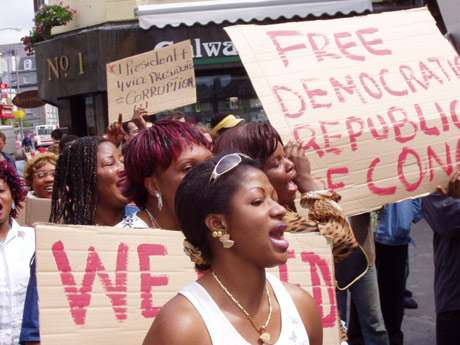
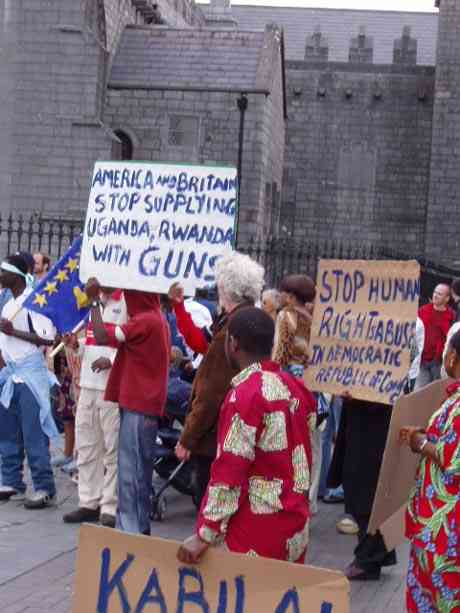
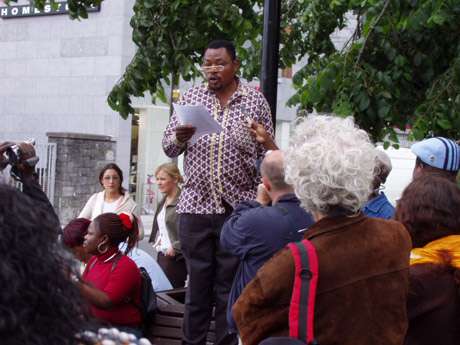
|
 galway |
rights, freedoms and repression |
news report
galway |
rights, freedoms and repression |
news report
 Thursday June 30, 2005 22:38
Thursday June 30, 2005 22:38 by Dunlo Tom - Shell to Sea
by Dunlo Tom - Shell to Sea





























 printable version
printable version

 Digg this
Digg this del.icio.us
del.icio.us Furl
Furl Reddit
Reddit Technorati
Technorati Facebook
Facebook Gab
Gab Twitter
Twitter
View Comments Titles Only
save preference
Comments (4 of 4)
Jump To Comment: 1 2 3 4and those on the street exchange missiles, petrol bombs and in some places the army/police fired tear gas as in the picture.
They are protesting the slow movement of the ruling regime to achieve change and build a future after the civil war, the transitional goverment seems to want to be a permenant one.
They have pretty much said exactly the same as the Congolese in Galway above.- The difference being the level of conflict.
Kinshasa capital of the DRC thursday.
C&P from Reuters-
Congo's opposition pledged on Friday to pile pressure on the government to quit, a day after at least one person was killed when security forces clashed with protesters angry at delays to post-war elections.
A U.N. spokesman said police used excessive force to break up the protests, which were triggered by the government's failure to organize elections by the end of June, as laid out by a 2003 peace deal to end a devastating five-year war.
"This is just the beginning," said Jean-Joseph Mukendi, a political adviser to the leader of the main Union for Democracy and Social Progess (UDPS) opposition party.
"If we keep it up the security services will tire," he said. "You could see yesterday that those in power were afraid."
Police in riot gear and soldiers patrolled Kinshasa's streets on Friday. U.N. troops drove around the city in white armored personnel carriers and a U.N. helicopter hovered overhead.
On Thursday, security forces used live bullets and tear gas to disperse protesters in sprawling, dilapidated Kinshasa, where two years of peace have done little to improve people's lives.
The resource-rich nation the size of western Europe has seen little economic progress and the government has failed to impose its authority over vast areas of the east, where armed gangs pillage and kill with impunity.
Kemal Saiki, spokesman for the United Nations mission in Congo, said casualties were lower than feared, with one person confirmed dead and 21 injured. Around 455 people were arrested.
"There were instances where (police) appear to have panicked and used their firearms," he said.
A UDPS spokesman said on Thursday that 10 people were killed in the capital Kinshasa, and several more killed in other protests in the south and west of the former Belgian colony.
Government wrangling, logistical delays and fighting in the east were behind the election delay. Some Congolese also suspect politicians are procrastinating to keep the perks of power.
On Friday, rocks and tear gas canisters had been cleared up from the capital's streets but the black marks left by burning tyres could still be seen.
"Things are getting back to normal after yesterday," said Pasteur Mena, a money changer at the busy Victoire roundabout where violent clashes took place on Thursday.
On Thursday night after hours of protests, the streets of Kinshasa, where the infectious rhythms of local music usually ring out until late, were deserted.
Congo's war killed around four million people, mainly from conflict-related hunger and disease. Killings continue in the east despite the presence in Congo of some 16,000 peacekeepers, the biggest U.N. peacekeeping mission in the world.
was one of the protesters there, that also saw the police, on thursday last-. When and only When, the movement of rock music philanthropy can extend true equality to its african performers, (and they except the invitations to play the gigs) will we see "progress".
Meanwhile, its Sting isn't it? talking about the brothers and sisters.
"burn your bracelets" (you don't need to wear a mask and scare the local mammies in the park. be careful of them, they're local mammies, scottish mammies. made of the same stuff and fibre that won the battle of trafalgar)
Congolese protest belgium photo:-
http://www.libe.com/page.php?Article=300175&Template=GALERIE&Objet=40516
The vast majority of the people of the region called the Democratic Republic of Congo have grave and long-standing cause for grievance – their plight being a result of nearly 150 years of Western policy which sees them as being something less than worthless.
Although the gun-law chaos must be stopped urgently, ‘free and democratic elections’ may just be another, more efficient way of deceiving the masses. Not just looking at Ireland, but looking at the DRC, there is a long history of rebels becoming the establishment and all promises being broken. As well as that, clientalist culture and local patronage – such as in Ireland, doesn’t bode well for liberal democracy.
Better to call for the election of local assemblies, and let them choose to confederate if they wish. Right now, he who gets Kinshasa’s seat of power gets lock stock and barrel, and will attract the IMF and friends like flies.
On a broader question, the European model of nation-states has not served Africa as a whole, and certainly not the artificial entity that is the DRC.
Marking the DRC’s independence day is to celebrate the artificial entity imposed by European colonial map-makers. The nation-state concept is problematic at the best of times, but in the case of the DRC (formerly known as Zaire (1971-1997)), the suggestion that there is a common Congolese interest (as opposed to a common ethno-linguistic, common African, or common global vision), is ludicrous.
This vacuous, official entity which is nearly thirty times the size of Ireland, and a population ten or 15 times ours, is divided along many lines of identity.
ethnically: Luba 18%, Kongo 16.1%, Mongo 13.5%, Rwanda (Banyamulenge)10.3%, Azande 6.1%, Bangi/Ngale 5.8%, Rundi 3.8%, Teke 2.7%, Boa 2.3%, Chokwe 1.8%, Lugbara 1.6%, Banda 1.4%, Others 16.6%.
Religious affiliations: Roman Catholic 50%, Protestant 20%, Kimbanguist 10%, Muslim 10%, Others 10%.
(Taken from Pocket Factfile of the World (Andromeda, Oxford, 1996)).
Language: French (official) and four national languages (Kiswahili, Tshiluba, Kikongo and Lingala), with over 200 local languages. The four national languages, like most written languages in Africa, are amalgamated constructs of European missionaries who wanted locals to read the Bible in their ‘own language’.
The peoples of the DRC geographical area do share with Burundi and Rwanda, a history of bloody repression by paymasters of Belgian King Leopold II, and a less wanton, but more exploitative Belgian regime till ‘independence’.
Only the National Congolese Movement of Patrice Lumumba supported a forward-looking unitarian state when independence was gained in 1960, and these progressives were quickly snuffed out by Western powers.
The ‘country’ was nominally united by the Western-backed Mobutu, and he enjoyed Western support so long as his despotism allowed for their continued exploitation of the region.
Edmond Lukusa: “We also seek an end to the exploitation of the DRC's economic resources by foreign agencies and call for immediate and appropriate tough action against those who are directly or indirectly responsible”
It was the Rwandan RPF (in pursuit of the genocidal interahamwe across its western border and in defense of its sizeable Rwandese population in the DRC (see above)), that sponsored the overthrow of Mobutu by Laurent Kabila, who had been fighting a low-level civil war for decades. His accession to power was no more legal than his son’s. Indeed, in 1998, Medsins San Frontiérs compiled a dossier of slaughters committed by his and RPF troops – he disagreed with their methodology.
At any rate, the Banyamulenge themselves rebel against Kabila in July 1998, and it goes on in Ituri (mostly by proxy on Kabila Jr’s. part), to this day. The UN are there in their thousands but I think their role is mineralian rather than humanitarian. In February 2005, UNSG prohibited sexual relations between UN forces and locals, when it emerged that UN personnel have been raping women and children and engaging in other appalling activities.
It is impossible to say how many have died in the east and north-east of the DRC since 1998. If the figure were 1,000 a day and this was extended to the entire seven years constantly, the figure would be closer to 2 million than ten million. This would still make it worse than Rwanda or Darfur if the morbidity of ranking terrors by numbers were engaged in; but thee is just no way of knowing. I suspect that AIDS and infant mortality are the biggest threat to people in the region, but the causes of conflict should not be ignored. Even the IRC say that malaria, sanitation and malnutrition are the primary killers, albeit as conditions created by war. I say ‘even’, because the objectivity of aid agencies can be questioned when donations/funds are at stake.
Bitter ethnic strife between the Hena and the Lendu has been compounded by elites in Kinshasa and Kigali trying to use them as pawns. Although Rwanda has some claim to ethnic contiguity with the eastern provinces of Ituri and Kivu (more than Kinshasa 2,000 kilometers to the west), it should be up to the people of these provinces to decide for themselves.
It is in France’s interests that Kinshasa remain the power-point, since the Tutsi are seen as ‘English-speakers’. For this reason France tried to support the genocidal interahamwe in Rwanda in 1994, and there were even clashes between the foreign legion and RPF in July of that year when France couldn’t get its way on the UNSC. When it was clear that the RPF were there to stay, France gave support back to Mobutu.
(BTW the RPF is still the governing party in Rwanda. With support from Hutus and Tutsi, the 2003 elections were deemed fair by all international observers. Human Rights Watch report gave the RPF government a complete clean bill of health in November 2003. ) July 1st was Rwanda's national day.
The ‘Congolese’ (Bakongo) community in Ireland speak Lingala and come from in or around Kinshasa – 2,000 kms away from the brutal atrocities. I hope they find themselves most at home and welcome in Ireland, but the analysis of the situation in the DRC, from their quarter, can be a bit coloured. There are, to my knowledge, no refugees from the eastern conflict in Ireland. Their poverty means that they can only move a matter of miles to escape horror.